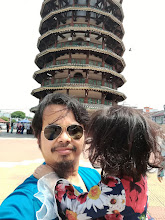Re-evaluating Evidence-based Practice
I have been the proponent of evidence-based medicine since graduating from the medical school. In fact, my view on pathophysiology of diseases changes tremendously the more I read about evidence-based practice. I look at the observational and cohort study as just a hypothesis-generating exercise. Testimonial - aarrghh, not even in my book of evidence. Many things have influence my thinking, for example statin- although it is commonly quoted as LDL lowering treatment, its effect on mortality reduction cannot be just through that mechanism. This is because, other medications that clearly reduce LDL, do not reduce mortality like statin does. So, pathophysiology plays an important role to understand the mechanism, but certainly it is a work in progress.
Then come my attachment at MGH. I rarely heard they talked about guideline this and guideline that. What they talked about is the mechanism behind a disease. If it involves B cell, they would try Rituximab. If its is complement activated, may be the new therapy would help. Cyclophosphamide, despite its benefit, is hardly used here given its side effect.
Then I attended a course on complementary medicine(like the traditional chinese medicine). How can a institution like Harvard Medical School promote such a therapy without RCT-based evidence? Are they being paid? Then I realised more and more RCT is being done. The evidence is emerging, but why did I make up my mind even before the evidence is clear? Am I being blinded?
Then I read a book that discuss about the philosophy of science. How "a factual fact" may not be true, based on our logic.
1. Conclusions based on limited observations are not absolute.
2. Scientific conclusions are based on limited observations.
3. Therefore, scientific conclusions are not absolute.
So, what we have is always a work-in-progress, hopefully a step towards understanding the absolute truth. So, we have to keep our minds opened.
1. Conclusions based on limited observations are not absolute.
2. Scientific conclusions are based on limited observations.
3. Therefore, scientific conclusions are not absolute.
So, what we have is always a work-in-progress, hopefully a step towards understanding the absolute truth. So, we have to keep our minds opened.
Then I read about testimony (definition: what others said), how despite me being very skeptical about it as part of evidence, we cannot run away from it. Our scientific fact is full or at least part of testimony. The thing we read in the book or journal, although the methodology is clearly explained, still it is based on the description by the authors - testimony. Picture of a circular earth, is a product of photography taken by others - testimony, unless we have direct observation from outside how earth looks like, and so with evolution etc. So, whether we like it or not, our lives depend on testimony of others. So the question is not whether testimony is part of evidence or it - IT IS!! But when to believe a testimony? It is usually when the one who speaks has the authority/is an expert in the area (especially if multiple unrelated experts) and we can trust the person.
This has nothing to do with those who lie to promote their products, at the expense of other people's health. This is to provoke on how we view 'factual information' and be opened to the new findings. And don't be obnoxious that we are the only person who's right, based on our 'scientific fact' and others are wrong.


0 Comments:
Post a Comment
Subscribe to Post Comments [Atom]
<< Home